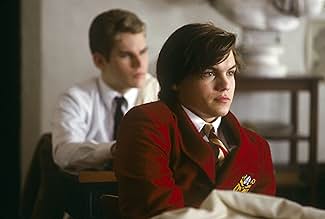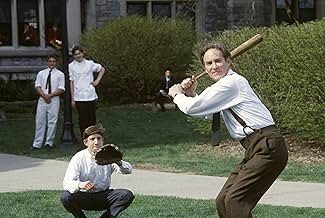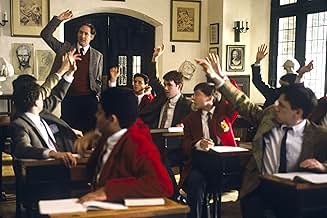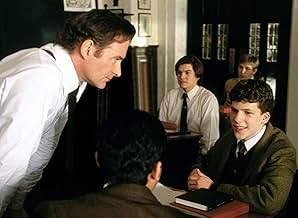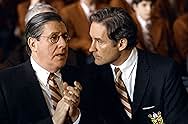VALUTAZIONE IMDb
6,9/10
18.278
LA TUA VALUTAZIONE
Un idealista insegnante di scuola elementare tenta di riscattare uno studente incorreggibile.Un idealista insegnante di scuola elementare tenta di riscattare uno studente incorreggibile.Un idealista insegnante di scuola elementare tenta di riscattare uno studente incorreggibile.
- Premi
- 2 candidature totali
Gabriel Millman
- Robert Brewster
- (as Gabe Millman)
Recensioni in evidenza
The movie deals with a good and idealist teacher (Kevin Kline) of Roman classic history and his relationship to a roguish and rebel pupil (Emile Hirsch) in a high class school . The teacher tries to redeem him but the continuous challenge makes that the incorrigible student (besides , being senator's son : Harris Yulin) results to be more and less difficult or impossible to dominate him . Meanwhile , the starring falls in love with an attractive , though married teacher (Embeth Davidtz) , and has problems with the college director (Edward Herrmann).
The picture is based on Ethan Canin's book titled ¨ Palace thief ¨. The story is narrated with sensitivity and intelligence and here are treated ethic and moral issues developed in great sense of ductility and fairness . As the teacher will have to face on the complex truth that can be manipulated or phony . The motion picture takes part of the School Sub-genre , whose maxim representation turns out to be the prestigious ¨Dead poet society¨ by Peter Weir . The film is displayed throughout among past and present time where we find the same characters though twenty five years later , except Kevin Kline the actors are different . The actors' interpretation is excellent , such as Kevin Kline as a mature and upright teacher who hands perfectly the role , Emile Hirsch as the rascal young is top-notch as well as Embeth Davidtz who is wonderful and enjoyable . James Newton Howard's musical score is sensitive and touching . The story was well directed by Michael Hoffman . Rating : Above average , well worth watching.
The picture is based on Ethan Canin's book titled ¨ Palace thief ¨. The story is narrated with sensitivity and intelligence and here are treated ethic and moral issues developed in great sense of ductility and fairness . As the teacher will have to face on the complex truth that can be manipulated or phony . The motion picture takes part of the School Sub-genre , whose maxim representation turns out to be the prestigious ¨Dead poet society¨ by Peter Weir . The film is displayed throughout among past and present time where we find the same characters though twenty five years later , except Kevin Kline the actors are different . The actors' interpretation is excellent , such as Kevin Kline as a mature and upright teacher who hands perfectly the role , Emile Hirsch as the rascal young is top-notch as well as Embeth Davidtz who is wonderful and enjoyable . James Newton Howard's musical score is sensitive and touching . The story was well directed by Michael Hoffman . Rating : Above average , well worth watching.
I say that this is a tough sell of a movie because it seems like most movies marketing of late have to have some catch,hook or twist about it to sell to audiences,something either sexy,violent or both. Movies that stress intellectual or moral higher pursuits are somewhat rare to come by and when they are,they either are heavy-handed(Dead Poets Society)or arcane,word-of-mouth projects(Kidco,Stand and Deliver).If they don't feature some level of arousing interest(two examples:Sirens or Kinsey,both films I greatly appreciated BTW),then they are probably going to fall under the wheels of Hollywood's promotional behemoth if they are produced for the large screen.
Such,I suspect,is the case with The Emperors Club, a Neil Tolin screenplay based on a Ethan Canin short story. The central figure is one William Hundert(Kevin KLine,perhaps never more dignified in role),a well-respected and generally popular teacher at a Catholic,boys-only academy,who teaches the classics(i.e.Roman and Greek history and culture). His long stay as an educator is put to the test(probably not the only time,but what has to be the most memorable) in the 1976-77 school year when an arrogant,selfish son of a congressman(Emile Hirsch,avec David Cassidy fro)enrolls in the school,for whom Hundert decides he's going to make a special effort to "mold" into a true student of enlightenment. His efforts then have effects on both his students and himself that stay with him long after.
Well-acted,well-scripted,thoughtful and gently guided by Michael Hoffman(who directed Kline in the pleasant Midsummer Night's Dream adaptation three years earlier),this film quietly came and went in the Autumn of 2002 and it seems like a shame,but not un-understandably so. This is a show with virtually no violence and very little(if any)sexual content and the majority of the cast are either rising young stars who haven't quite reached high acclaim yet or are older character actors,so one will enter this on virtually a blind-faith interest of the film's topic or(more likely)an appreciation for Mr.Kline. To be honest and tell on myself,when this film was out I passed it up and didn't really sit down to appreciate it until very recently,and that was a a free library rental! As is,free or not,this is clearly a unique and recommendable movie.
Such,I suspect,is the case with The Emperors Club, a Neil Tolin screenplay based on a Ethan Canin short story. The central figure is one William Hundert(Kevin KLine,perhaps never more dignified in role),a well-respected and generally popular teacher at a Catholic,boys-only academy,who teaches the classics(i.e.Roman and Greek history and culture). His long stay as an educator is put to the test(probably not the only time,but what has to be the most memorable) in the 1976-77 school year when an arrogant,selfish son of a congressman(Emile Hirsch,avec David Cassidy fro)enrolls in the school,for whom Hundert decides he's going to make a special effort to "mold" into a true student of enlightenment. His efforts then have effects on both his students and himself that stay with him long after.
Well-acted,well-scripted,thoughtful and gently guided by Michael Hoffman(who directed Kline in the pleasant Midsummer Night's Dream adaptation three years earlier),this film quietly came and went in the Autumn of 2002 and it seems like a shame,but not un-understandably so. This is a show with virtually no violence and very little(if any)sexual content and the majority of the cast are either rising young stars who haven't quite reached high acclaim yet or are older character actors,so one will enter this on virtually a blind-faith interest of the film's topic or(more likely)an appreciation for Mr.Kline. To be honest and tell on myself,when this film was out I passed it up and didn't really sit down to appreciate it until very recently,and that was a a free library rental! As is,free or not,this is clearly a unique and recommendable movie.
I thoroughly enjoyed this movie. I don't care if others think it was predictable - so what? Wasn't Jaws predictable? How about Alien? Once in a while a movie has a lesson in it - like this one. Even if it is a lesson that gets played over and over.
I really didn't care for the mildly romantic banter between Kline's character and his female interest. Maybe the purpose of the character was to show Dr. Hundert was not gay - but that seems awfully shallow to me. If this movie was not about a gay teacher, why did the writer feel obligate to prove the reverse? All in all though, this was a GOOD movie - very good.
I really didn't care for the mildly romantic banter between Kline's character and his female interest. Maybe the purpose of the character was to show Dr. Hundert was not gay - but that seems awfully shallow to me. If this movie was not about a gay teacher, why did the writer feel obligate to prove the reverse? All in all though, this was a GOOD movie - very good.
Klein was superb as the bookish teacher intent on molding boys' characters' as well as teaching them. When he went out of his way to aid a troubled student he wound up depriving another causing some concerns for his conscience. The boy he felt he should help was the son of a bigshot politico who had no clue as to the needs of his son. Too busy being a power broker this ass arrogantly claimed he would mold his son's character. How? He's seldom around and when he is there is no communication between himself and his offspring. Like so many fathers, I wonder why they even want children knowing there is no inclination to interact with them. Brings to mind the Harry Chapin song "Cat's in the Cradle" which speaks to many, many dads. The Emma Willard School provided a nice backdrop for a very good film. 4 stars.
From `Goodbye Mr. Chips' in the 1930's to `Dead Poet's Society' in the 1980's, the movies have had a long-running love affair with inspirational, sentimental stories set at ivy-covered, collegiate-gothic, all-male prep schools. These films inevitably center around a beloved teacher and the lifelong bond he forges with his devoted students.
The latest addition to the genre a successful one is `The Emperor's Club,' with Kevin Kline assuming the role of the teacher who considers it his duty not only to instruct his students in the details of classical history but to mold them into men of integrity and character in the process. `The Emperor's Club' follows the standard formula up to a point. William Hundert is the most highly respected faculty member at St. Benedict's Academy. He is able to bring the history of the ancient Greeks and Romans to vivid life for his admittedly highly motivated young charges. Then, one day, into his classroom strides Sedgwick Bell, a bright, highly unmotivated student who would rather mock the stuffiness of education and inspire his buddies to feats of rabblerousing than devote his life to the serious pursuit of academia. It, thus, becomes Hundert's job to turn Sedgwick around, a feat that always seems much easier to accomplish in the movies than it ever is in real life.
`The Emperor's Club,' after its rather conventional beginning, deviates from its predecessors in one key respect: Hundert, though a man of values and integrity, is not above compromise himself, and he winds up making a very serious one, the ramifications of which he has to live with for many years to come. Rather than showing him as some sort of saintly figure, screenwriter Neil Tolkin (working from a short story by Ethan Canin) and director Michael Hoffman allow Hundert's humanity to shine through. He is a flawed individual who permits personal feelings to cloud his judgments and who is willing, once he has created a problem, to allow the truth of his own guilt to remain hidden even when innocent victims suffer as a result of his actions. `The Emperor's Club' is also notable for its clear-eyed recognition that not all situations in life need have a satisfying resolution, that some people simply do not acknowledge their own failings and, therefore, never develop into morally superior people no matter how many experiences life throws at them. Yet, what breaks Hundert's heart is the recognition he comes to that such a person is often times more highly rewarded by the world than the man who follows along the straight-and-narrow path all his life.
Kline gives a superb performance as Hundert, capturing the quiet dignity, understated passion and conflicted conscience of a man who loves his boys and who tries to do the right thing but who, like the rest of us, doesn't always succeed in doing so. Emile Hirsch is also excellent as young Sedgwick, the boy whose need for attention and lack of moral guidance from his father lead him to accept the winning-at-all-cost philosophy to get him through life.
`The Emperor's Club,' despite having its roots firmly planted in a grand storytelling tradition, still manages to take us into new territory from time to time and its recognition of the importance of education and academics (we actually get to learn a little about Roman history while watching the movie) makes it virtually unique among films of its time.
The latest addition to the genre a successful one is `The Emperor's Club,' with Kevin Kline assuming the role of the teacher who considers it his duty not only to instruct his students in the details of classical history but to mold them into men of integrity and character in the process. `The Emperor's Club' follows the standard formula up to a point. William Hundert is the most highly respected faculty member at St. Benedict's Academy. He is able to bring the history of the ancient Greeks and Romans to vivid life for his admittedly highly motivated young charges. Then, one day, into his classroom strides Sedgwick Bell, a bright, highly unmotivated student who would rather mock the stuffiness of education and inspire his buddies to feats of rabblerousing than devote his life to the serious pursuit of academia. It, thus, becomes Hundert's job to turn Sedgwick around, a feat that always seems much easier to accomplish in the movies than it ever is in real life.
`The Emperor's Club,' after its rather conventional beginning, deviates from its predecessors in one key respect: Hundert, though a man of values and integrity, is not above compromise himself, and he winds up making a very serious one, the ramifications of which he has to live with for many years to come. Rather than showing him as some sort of saintly figure, screenwriter Neil Tolkin (working from a short story by Ethan Canin) and director Michael Hoffman allow Hundert's humanity to shine through. He is a flawed individual who permits personal feelings to cloud his judgments and who is willing, once he has created a problem, to allow the truth of his own guilt to remain hidden even when innocent victims suffer as a result of his actions. `The Emperor's Club' is also notable for its clear-eyed recognition that not all situations in life need have a satisfying resolution, that some people simply do not acknowledge their own failings and, therefore, never develop into morally superior people no matter how many experiences life throws at them. Yet, what breaks Hundert's heart is the recognition he comes to that such a person is often times more highly rewarded by the world than the man who follows along the straight-and-narrow path all his life.
Kline gives a superb performance as Hundert, capturing the quiet dignity, understated passion and conflicted conscience of a man who loves his boys and who tries to do the right thing but who, like the rest of us, doesn't always succeed in doing so. Emile Hirsch is also excellent as young Sedgwick, the boy whose need for attention and lack of moral guidance from his father lead him to accept the winning-at-all-cost philosophy to get him through life.
`The Emperor's Club,' despite having its roots firmly planted in a grand storytelling tradition, still manages to take us into new territory from time to time and its recognition of the importance of education and academics (we actually get to learn a little about Roman history while watching the movie) makes it virtually unique among films of its time.
Lo sapevi?
- QuizWhen filming the movie, the location (Emma Willard school in Troy, NY) was still operating as a girl's school. Emile Hirsch reportedly complained about the students, claiming that they were pestering him for his phone number. He also (reportedly) said some unsavory things about the school in general. When the students heard about this, they demanded an apology from Hirsch, which he delivered in front of the entire student body. At the school viewing, whenever he appeared on screen, the girls booed loudly and stories about him still circulate through the student body.
- BlooperWhen the girls are removing their shirts to go skinny-dipping, a Victoria's Secret Body by Victoria bra is revealed. That bra is from the time the film was made, not the mid-1970s when the scene takes place.
- Citazioni
William Hundert: As a great Aristophanes once wrote-- roughly translated-- "Youth ages, immaturity is outgrown. Ignorance can be educated and drunkenness sobered, but stupid... lasts forever."
- Colonne sonoreFunk 49
Written by Jim Fox, Joe Walsh, and Dale Peters
Performed by James Gang
Courtesy of MCA Records
Under license from Universal Music Enterprises
I più visti
Accedi per valutare e creare un elenco di titoli salvati per ottenere consigli personalizzati
- How long is The Emperor's Club?Powered by Alexa
Dettagli
- Data di uscita
- Paese di origine
- Lingua
- Celebre anche come
- The Emperor's Club
- Luoghi delle riprese
- Aziende produttrici
- Vedi altri crediti dell’azienda su IMDbPro
Botteghino
- Budget
- 12.500.000 USD (previsto)
- Lordo Stati Uniti e Canada
- 14.118.751 USD
- Fine settimana di apertura Stati Uniti e Canada
- 3.846.780 USD
- 24 nov 2002
- Lordo in tutto il mondo
- 16.318.449 USD
- Tempo di esecuzione
- 1h 49min(109 min)
- Colore
- Mix di suoni
- Proporzioni
- 1.85 : 1
Contribuisci a questa pagina
Suggerisci una modifica o aggiungi i contenuti mancanti



